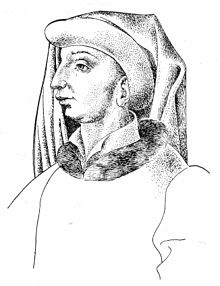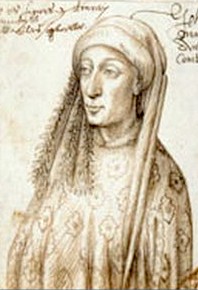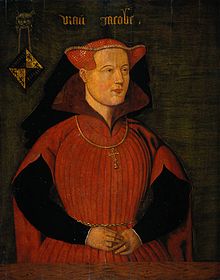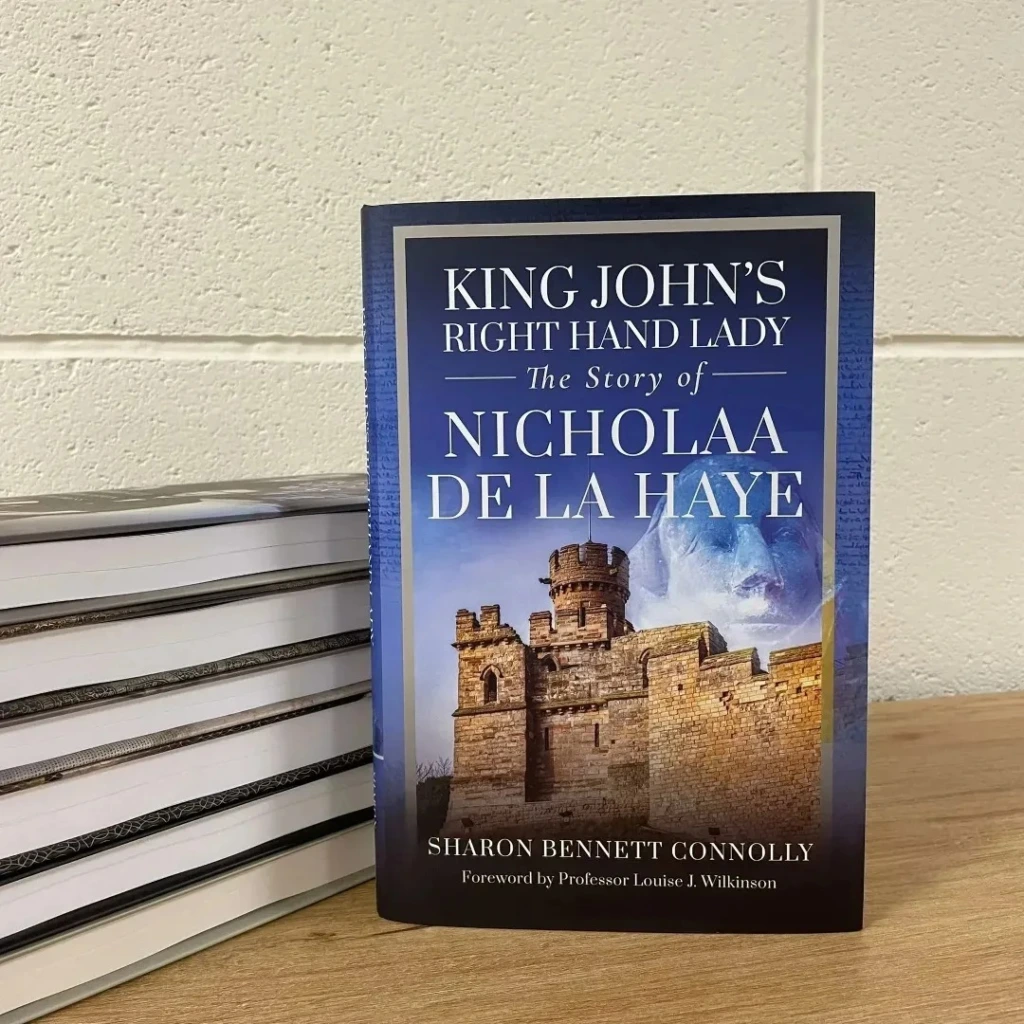Jacqueline of Hainault, also known as Jacoba of Bavaria, is one of those Medieval ladies who seems to have slipped under the radar of history. Until last week I knew very little about her; and yet her life is one of the most colourful I have ever come across.
Born on or shortly before the 16th July 1401 at Le Quesnoy, Flanders, Jacqueline was the daughter of William VI, Count of Holland, and Marguerite of Burgundy; her grandfather was Philippe the Bold, Duke of Burgundy.
Although she had at least 9 illegitimate siblings, Jacqueline was her father’s sole heir. And in order to strengthen her position, William arranged a marriage for Jacqueline while she was still an infant. In 1406 she was betrothed to John of Valois, Duke of Touraine, the fourth son of King Charles VI of France, and only 3 years older than Jacqueline. With little chance of inheriting the French throne, and with a view to him eventually ruling Hainault, the responsibility for John’s education was handed over to Count William; he would be raised alongside his future wife.
The young couple married in 1415 at The Hague. Only 4 months after the wedding John’s older brother Louis, Dauphin of France, died and John became Dauphin and heir to the French throne.
Within 2 years John himself was dead, on 4th April 1417, with rumours circulating that he was poisoned, although this is far from certain. His younger brother, Charles, became Dauphin and Jacqueline was a widow at only 16.
In the meantime, although Holland was not subject to Salic Law (where a woman could not inherit), Jacqueline’s father had been having a hard time getting his people and Sigismund, the Holy Roman Emperor, to accept Jacqueline as his heir. They finally refused outright in 1416.
When Count William died only 2 months after her husband, on 31st May 1417, Jacqueline was accepted as Countess of Hainault; however Holland and Zeeland recognised her uncle John of Bavaria, backed by Sigismund, as their count.
At this point Jacqueline’s mother and uncle stepped in. Margaret of Burgundy and her brother, John the Fearless, Duke of Burgundy, started looking around for a suitable husband for Jacqueline. Unfortunately they decided on her cousin John IV, Duke of Brabant. The Duke of Burgundy saw the marriage as an opportunity to expand his influence over Jacqueline’s lands, and applied for a Papal Dispensation. The Dispensation was given, but withdrawn just over 2 weeks later, following pressure from Sigismund.
The couple married anyway, in March 1418. The marriage was a disaster, politically and personally. John managed to antagonise both his wife and her subjects. Initially Jacqueline’s husband helped in the fight against her avaricious uncle, John of Bavaria and in 1419 John the Fearless settled the dispute in his niece’s favour; only for John of Brabant to then mortgage Holland and Zeeland to John of Bavaria for a period of 12 years.
Jacqueline ran away; first to her mother in Hainault and then on to England, where she was welcomed by Henry V. The king granted her a pension, and made her godmother to his only son, the future Henry VI.
In 1421 Jacqueline repudiated her marriage to John of Brabant, with the support of Antipope Benedict XIII in Avignon. And in 1422, with a view to strengthening England’s position against France, she married the king’s younger brother Humphrey, Duke of Gloucester. The public were behind the marriage and even supported Humphrey’s attempts to recover Jacqueline’s lands.
As Duchess of Gloucester, Jacqueline was made a Lady of the Garter in 1423, and, at some point, accepted Eleanor Cobham into her household as a lady-in-waiting; Eleanor would later go on to become Humphrey’s 2nd wife. In 1424 Jacqueline gave birth to her only recorded child, who was stillborn.
In 1424 Humphrey and Jacqueline led an army to the Low Countries, to recover Jacqueline;s inheritance. Though Humphrey managed to recover much of Hainault, he came up against opposition from the new Duke of Burgundy, Philip III The Good, destroying the Anglo-Burgundian alliance.
Many of Jacqueline’s subjects, however, considered Humphrey an invader and, refusing to recognising him as count, gave their support to Burgundy. So, in 1425, Humphrey returned to England; Jacqueline’s mother had objected to her returning with him, so she moved on to Mons.
The officials of Mons had promised to protect Jacqueline, but once Gloucester was gone, she was handed over to the Duke of Burgundy and imprisoned in Ghent. In the same year her uncle, John of Bavaria, died and her lands were handed over to Burgundy, as regent, by John of Brabant.
Jacqueline escaped her imprisonment, dressed as a man, and escaped escorted by 2 knights, to Gouda. From Gouda, she led the Dutch resistance to the Burgundian takeover. However, when Burgundy besieged Gouda, she was forced to surrender.
In the meantime, Pope Martin V had authorised an investigation into the state of Jacqueline’s marriages. In 1428 he declared her marriage to Humphrey of Gloucester null and void, as her marriage to John of Brabant was legally valid. John of Brabant had died in 1426, so a remarriage between Humphrey and Jacqueline would have been acceptable – had Humphrey’s attentions not already turned to Eleanor Cobham.
Jacqueline still had sympathisers in England, however and the ladies of London petitioned Humphrey, according to the chronicler Stow their letters “containing matter of rebuke and sharpe reprehension of the Duke of Gloucester, because he would not deliver his wife Jacqueline out of her grievous imprisonment, being then held prisoner by the Duke of Burgundy, suffering her to remaine so unkindly, contrary to the law of God and the honourable estate of matrimony”.
Humphrey had managed to get a 9,000 marks grant from the king’s council, in 1427, to help Jacqueline recover her lands; however John, Duke of Bedford, put a stop to the expedition by opening up negotiations with the Duke of Burgundy.
So, in 1428, Jacqueline of Hainault is a prisoner of the Duke of Burgundy, with no prospect of help from England. With few options left to her, she came to an agreement with Philip the Good. In the Treaty of Delft, of 3rd July 1428, Jacqueline retained her title of countess, but administration for her 3 counties passed to Philip. Philip the Good was confirmed as her heir, should she die childless; and she was not to marry without the consent of Philip, her mother and the 3 counties.
Philip, however, broke the treaty by mortgaging the revenues of Holland and Zeeland to members of the Borselen family from Zeeland.
In 1432 Jacqueline secretly married one of the Borselen family, Francis, Lord of Zuilen and St Maartensdijk.
Whether or not this was a plot to overthrow Burgundian rule in Holland, Philip the good certainly saw it that way. Francis was imprisoned in October 1432 and Jacqueline was forced to abdicate as countess in 1433, relinquishing her titles in return for an income from several estates. After years of civil war, Jacqueline’s financial position prior to the settlement had been desperate.
Jacqueline and Francis’ relationship appears to have been a love match and, in July 1434 they had a 2nd, public, marriage ceremony at Maartensdijk Castle. After such an adventurous life, and having fought so hard for her inheritance, Jacqueline settled down to married life. Her happiness was short-lived, however, as Jacqueline died at Teilingen on 8th October 1436, probably of tuberculosis. She was buried at the Hague.
*
Pictures courtesy of Wikipedia
*
Sources: Brewer’s British Royalty by David Williamson; History Today Companion to British History Edited by Juliet Gardiner and Neil Wenborn; Britain’s Royal Families, the Complete Genealogy by Alison Weir; medievalists.net; r3.org; susanhigginbotham.com; britannica.com; historyofroyalwomen.com.
*
My books
Signed, dedicated copies of all my books are available, please get in touch by completing the contact me form.
Out now!
King John’s Right-Hand Lady: The Story of Nicholaa de la Haye is now available as a hardback and Kindle from Pen & Sword Books, bookshop.org and Amazon (UK and US).
In a time when men fought and women stayed home, Nicholaa de la Haye held Lincoln Castle against all-comers. Not once, but three times, earning herself the ironic praise that she acted ‘manfully’. Nicholaa gained prominence in the First Baron’s War, the civil war that followed the sealing of Magna Carta in 1215.
A truly remarkable lady, Nicholaa was the first woman to be appointed sheriff in her own right. Her strength and tenacity saved England at one of the lowest points in its history. Nicholaa de la Haye is one woman in English history whose story needs to be told…
Also by Sharon Bennett Connolly:
Defenders of the Norman Crown: The Rise and Fall of the Warenne Earls of Surrey tells the fascinating story of the Warenne dynasty, of the successes and failures of one of the most powerful families in England, from its origins in Normandy, through the Conquest, Magna Carta, the wars and marriages that led to its ultimate demise in the reign of Edward III. Defenders of the Norman Crown: Rise and Fall of the Warenne Earls of Surrey is now available from Pen & Sword Books, Amazon in the UK and US, and Bookshop.org.
Ladies of Magna Carta: Women of Influence in Thirteenth Century England looks into the relationships of the various noble families of the 13th century, and how they were affected by the Barons’ Wars, Magna Carta and its aftermath; the bonds that were formed and those that were broken. It is now available in paperback and hardback from Pen & Sword, Amazon, and Bookshop.org.
Heroines of the Medieval World tells the stories of some of the most remarkable women from Medieval history, from Eleanor of Aquitaine to Julian of Norwich. Available now from Amberley Publishing and Amazon, and Bookshop.org.
Silk and the Sword: The Women of the Norman Conquest traces the fortunes of the women who had a significant role to play in the momentous events of 1066. Available now from Amazon, Amberley Publishing, and Bookshop.org.
Alternate Endings: An anthology of historical fiction short stories including Long Live the King… which is my take what might have happened had King John not died in October 1216. Available in paperback and kindle from Amazon.
*
Podcast:
Have a listen to my A Slice of Medieval podcast, where Derek Birks and I discuss history and historical fiction and welcome such esteemed guests as Bernard Cornwell!
For forthcoming online and in-person talks, please check out my Events Page.
You can be the first to read new articles by clicking the ‘Follow’ button, liking our Facebook page or joining me on Twitter and Instagram.
*
©2015 Sharon Bennett Connolly FRHistS









Reblogged this on History's Untold Treasures and commented:
H/T History, the Interesting Bits
LikeLiked by 1 person
What a woman! What a life!
LikeLike
Wasn’t she? She had to be strong to go through all that. Amazing!
LikeLike
Reblogged this on karenstoneblog and commented:
Another fascinating intrepid female from History . Well written as always by the author of History…the interesting bits
LikeLike
Thank you Karrie. 🙂
LikeLike
Very interesting. I first came across her years ago in a novel – I, Jacqueline. A really good read.
LikeLike
Thank you Jasmine, I haven’t read that novel – I will have to keep an eye out for it. Thank you and Best wishes, Sharon 🙂
LikeLike
I’m trying to remember now: Was she the one who screwed over Philippa of Hainaut and her inheritance?
LikeLike
Not at all, Jacqueline was born 32 years after the death of Philippa of Hainault. As the article says, it was Jacqueline who was denied her inheritance by scheming make relatives, but it had nothing to do with Philippa, who was a great aunt of Jacqurline’s.
LikeLike
wow! Thats incredible! I cant believe she has been hidden away in history!
LikeLike
Totally agree Lou. There are so many women out there whose stories have been lost or ignored. And yet, they led such incredible lives.
LikeLike
She certainly had an interesting life. I do wonder if Humphrey might have fought a little harder, and perhaps not abandoned her had their child survived.
LikeLiked by 1 person
I agree – i think her story would have been very different, has the baby lived. Gloucester would have had more incentive to win back his child inheritance.
LikeLike